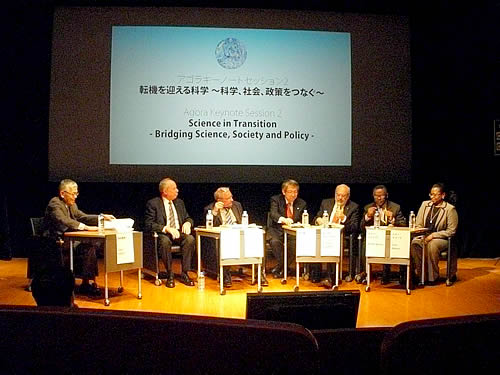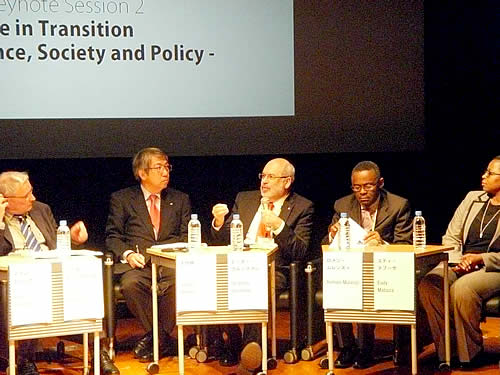2014年11月7日~9日まで、サイエンスアゴラ2014「あなたと創るこれからの科学と社会」と題し、さまざまなステークホルダーが参加し、科学と社会について議論する場が設けられました。アゴラキーノートセッション2「転機を迎える科学~科学、社会、政策をつなぐ~」では、科学の可能性と限界性、ステークホルダーとの対話のあり方について議論が交わされました。
On November 7-9, 2014, Science Agora 2014 titled “Building relations between future society and science” was held as an opportunity for various stakeholders to participate in discussions on science and society. This section reports the discussions in Agora Keynote Session 2 “Science in Transition - Bridging Science, Society and Policy -.”

アメリカ科学振興協会(AAAS)CEOのアラン・レシュナー氏、ユーロサイエンス事務局長のピーター・ティンデマンス氏、科学技術振興機構理事の大竹暁氏、ニュージーランド主席科学顧問のピーター・グルックマン氏、開発途上国における科学振興のための世界科学アカデミー(TWAS)事務局長のロメン・ムレンズィ氏、南アフリカ共和国大使館科学技術担当公使のユディ・マブーザ氏、モデレーターに政策研究大学院大学教授の有本建男氏が登壇しました。
Science Agora 2014 started on November 7. In “Science in Transition - Bridging Science, Society and Policy -” which is one of the six Agora Keynote Sessions that form the keynote for the entire forum, the future roles and responsibilities of science as well as its relationship with society were discussed. Speakers at the session were Alan I. Leshner, CEO of the American Association for the Advancement of Science (AAAS), Peter Tindemans, Secretary General of Euroscience, Satoru Ohtake, Senior Executive Director at the Japan Science and Technology Agency (JST), Peter Gluckman, Chief Science Advisor of the New Zealand government, Romain Murenzi, Executive Director of the World Academy of Science (TWAS) and Eudy Mabuza, Minister-Counsellor: Science and Technology at the South African Embassy in Tokyo. Tateo Arimoto, Professor at the National Graduate Institute for Policy Studies (GRIPS) served as the moderator.
有本氏は、開幕セッションの流れを受けつつ、インターネットの誕生による情報流通革命やグローバリゼーションの進展などが、社会システムや企業戦略、科学の方法などに大きな変化を起きこしつあると指摘。科学技術のあり方について、一方向から双方向へ、画一性から多様性へのシフトがますます求められると語りました。また、「科学は知識生産だけではなく、ステークホルダーとのCo-DesignやCo-Productionを通じて、社会の中の社会のための科学の確立が重要となっている。そのためになにができるかをみなさんと考えていきたい」とパネルセッションの方向性を提案しました。
In light of the discussions in the Opening Session, Mr. Arimoto pointed out that the information distribution revolution derived from the launch of the Internet, the progress in globalization and other factors have initiated major changes in social systems, corporate strategies, scientific methods, etc. He said that there would be an increasing need for science and technology to move from being one-way to being interactive and from being uniform to being diverse. He then directed the panel discussion by saying, “It has become important to create a kind of science which is useful for society through co-design and co-production with stakeholders, rather than just producing scientific knowledge. I would like to invite all of you to discuss what we can do to achieve this.”
「科学と社会との健全な関係が必要」とレシュナー氏は主張。本来、人類のためにあるはずの科学が、社会の中で十分に理解されていない現状を踏まえ、市民に対して伝え続けていく必要があると説きました。1848年から活動をしているAAASは、科学の健全性や科学と市民をつなぐコミュニケーション、社会における科学の重要性を高めるための政策提言、科学者の考えを市民にわかりやすく伝えるための研修などを行っています。知識だけではない「伝える」ことの重要性を認識することが、いま科学の側に求められていると言います。
Dr. Leshner argued that society needs a healthy relationship with science. In light of the current situation where the public does not fully understand science or that science should exist for humanity, Dr. Leshner explained that scientists need to continue to communicate with citizens. The AAAS, which has been active since 1848, is engaged in the following activities: promoting the integrity of science; enhancing communication which connects science and citizens; giving policy recommendations which aim to increase the importance of science in society; and training scientists to communicate their ideas to citizens in an easy-to-understand manner. Dr. Leshner said that what is required today is for the scientific world to recognize the importance of communication as well as gaining knowledge.
科学者による草の根活動から立ち上がったユーロサイエンスは、地域と連携しながら欧州各地に活動を展開、科学者の研究を市民に知ってもらう取り組みを行ってきました。そのなかで「独立性を維持すること」が重要とティンデマンス氏は言います。社会とのつながりの中で、政治的な意図に左右されず中立的な立場であり続けるからこそ、科学はすべての人たちにとって意義があると語りました。。
Euroscience, which was founded through scientists’ grassroots activities, has been conducting activities in various parts of Europe in cooperation with local communities with the aim of letting citizens know about the research carried out by scientists. Through their activities, Dr. Tindemans said that he found it important to maintain independence. He said that science can be useful for everyone only if its neutrality is maintained rather than it being affected by political factors in society.
東日本大震災をきっかけに、日本では科学に対する信頼が低下していると大竹氏は指摘。サイエンスアゴラはもともと、日本におけるAAAS年次総会やユーロサイエンス・オープンフォーラムのような場づくりを目指して立ち上げられました。今、サイエンスアゴラは科学と社会の関係をつなぎなおすための場として、活動やあり方そのものを見直さなければいけない時期にきていると言います。そのために若い研究者が活躍する場を提供し、これからの時代の科学と社会のあり方を改めて見出す活動を重点的に行なっていきたいと強調しました。
Mr. Ohtake pointed out that public trust in science has fallen in Japan since the Great East Japan Earthquake. He explained that Science Agora was launched with the aim of creating a venue in Japan which is equivalent to the AAAS Annual Meeting or the Euroscience Open Forum. He also said that it is time to revise the activities of Science Agora and its role in society as a venue to rebuild the relationship between science and society. For this reason, he argued that the JST should provide opportunities for young researchers to become actively involved as well as prioritizing activities to rediscover the ideal relationship between science and society.
社会と科学との関係を考えるうえで、経済発展は重要な要点です。ルワンダ政府は、経済成長に向けて「人的資源開発・知識集約型経済」を目指す「VISION2020」宣言をし、科学技術教育に力をいれ教育インフラの整備や産学連携への取り組みを強化していきました。元ルワンダ科学技術大臣のムレンズィ氏は、「科学に対して積極的に力をいれることは人材開発につながる。それによって持続可能な社会の基盤づくりに貢献でき、経済や産業などさまざまな面でのイノベーションを促進できる」と言います。科学への認識を市民レベルから向上させ、未来を担う若い人たちへの教育投資を積極的に行うことで、科学の価値や社会におけるあり方を見出そうとしていました。
Economic development is an important standpoint when considering the relationship between society and science. The Rwandan government announced the “Vision 2020” declaration which says that the state will aim at an economy based on human resource development and knowledge, in order to achieve economic development. To this end, the government has put more effort into science and technology education and strengthened its efforts on education infrastructure development and industry-academia cooperation. Dr. Murenzi, who is an ex-Minister of Science and Technology in Rwanda, said that an active commitment to science would lead to human resource development and therefore contribute to the creation of the foundation for a sustainable society as well as enabling innovation in various areas including the economy and industry. Rwanda is trying to establish the value and role of science in society, by increasing the understanding of science at the citizen level and actively investing in the education of young human resources who will create the future society.
1961年に建国した南アフリカでも、経済発展に向けて人材開発に力を入れることが急務でした。そこで科学に対して予算を投入し、あらゆる人の科学への意識を高める取り組みを行ってきたとマブーザ氏は言います。「未来の科学者、イノベーターを育てることを科学大臣含めて一丸になって取り組んでいる。若い子どもたちに科学を好きになってもらうイベントや場づくりを通して、科学に対する認識と科学者と市民との壁をなくすことが大事だと考えている」(マブーザ氏)。
In South Africa which was only established in 1961, there was an urgent need to make efforts on human resource development for economic development. According to Ms. Mabuza, for this purpose, South Africa allocated a budget for science and conducted activities to raise people’s interest in and awareness of science. Ms. Mabuza said that all the personnel including the Science Minister are making a united effort to nurture future scientists and innovators. She also said that they think it important to increase the understanding of science and remove barriers between scientists and citizens, by creating events and venues through which young children start to like science.
これらの活動によって、南アフリカやルワンダでは経済発展が進み優秀な人材を多く輩出する国としての実績が生まれつつあります。ムレンズィ氏とマブーザ氏の話をうけ、ティンデマンス氏は「政府と市民、科学者がつながりながら形と実績をつくっている実例」とし、「はじめからコミュニケーションとエンゲージメントを意識した設計になっている。アフリカの国々がこうした取り組みを行なっているのは、先進国以上に意味がある。」と評価しました。
The above-mentioned activities in South Africa and Rwanda are producing results at the national level: economic development is progressing and many excellent human resources have been produced. In response to the speeches by Dr. Murenzi and Ms. Mabuza, Dr. Tindemans said that they are actual examples of governments, citizens and scientists shaping science and producing results through the creation of ties between each other. He then praised the efforts of the two countries by saying that their systems are designed to enable communication and engagement from the start and that the efforts taking place in African countries have an even more significant meaning than the efforts being made in industrialized countries.
ステークホルダーとのコミュニケーションにおいては、その先にどのような目標を見据えるのかが重要です。アフリカ諸国の取り組みは、目標を定めそこへ向かってステークホルダー同士がつながり、さまざまな活動を展開した具体例として参考になります。同時に、ステークホルダー同士をつなぐ「トランスレーター」の機能も求められています。科学者と市民、政府と科学者など、さまざまなセクターを横断的につなぐ機能が数多く存在することでコミュニケーションは円滑に進みます。そうした「つなぐ」機能がこれからますます求められてくると考えられます。
It is important to consider what the goal should be for communicating with stakeholders. The efforts by African countries provide us with useful examples where the state properly set goals, the stakeholders created ties between each other and they worked towards the goals by conducting various activities, which then produced results. At the same time, it is also necessary to have “translators,” i.e. those who are capable of connecting different stakeholders. Communication between stakeholders will be better facilitated if there are many entities that can connect scientists and citizens, government and scientists, as well as various sectors. It is likely that the need for entities that connect different stakeholders will only increase from now on.

「従来と比べて、気候変動や環境問題といった、国境を越えた大きな問題に対しても科学が取り組まなければいけない時代にある」とグルックマン氏は指摘します。それらは、社会にとって重要であると同時に、すべてを科学で対処することが難しい課題です。政治家が望むような、絶対的な数字や結果が科学によって導かれるわけではありません。また、科学が導き出した答えを、社会がそのまま受け入れることも少ないでしょう。科学と社会とのあり方において、科学者は何をどのように伝えるべきでしょうか。グルックマン氏は「科学者が、社会の価値観にもコミットしていくことが求められている」時代だと語りました。
Sir Peter Gluckman said that today science has to tackle large-scale cross-border problems such as climate change and other environmental problems. They are important issues for society, but it is also true that it is difficult for science to resolve all these issues. Science does not necessarily produce the absolute answers that politicians might want, and it is rare for society to accept the answers that science produces unconditionally. What should scientists communicate with society and how should they do it? Sir Peter Gluckman said that today scientists need to abide by society’s values.
知識だけを一方的に話すのではなく、科学の社会的な価値を踏まえることが科学者に求められています。しかし、科学者は社会に対して何らかの意思決定をする権利を持っているわけではありません。あくまで助言として中立的な立場から、政治家や社会に対して科学の可能性や価値を提供し、判断を促すこと。評価し、決断をする材料と価値を提供すること。そのためのコミュニケーションを行うことが科学者に求められるのではないかと議論が交わされました。
Scientists are expected to communicate to the public the usefulness of science to society, rather than just giving knowledge. However, scientists do not have decision making power. It was discussed that the following roles are perhaps what society expects from scientists: maintain themselves as neutral advisors and facilitate decisions by providing the possibilities and merits of science to politicians and society; provide information and the merits of science that help in the making of assessments and in decision making; and have communication in order to provide the above-mentioned information and merits.
会場からは、「科学の限界を多くの人に認識してもらう必要もある」といった意見も飛び出しました。レシュナー氏は同意しながら、政策決定の現場において不確定要素を見出すことの重要性を指摘しました。
Some people in the audience said that more people should recognize the limits of science. Dr. Leshner agreed and pointed out the importance of identifying the uncertainties involved in the policy decision making process.
「政府は、限りある情報を元に、何らかの政策決定をしなければならない。知識がなくても決断を迫られる。そこで、科学者がリサーチをし、確定要素と不確定要素に対する情報を精査することが求められる。社会をより良いものにしたいという気持ちはみんな同じ。だからこそ、科学者は彼らが理解できるようにコミュニケーションを行わなければいけない。それは一般の人たちに対しても同様だ。私たちがやらなければいけないことは、科学の重要性と同時に、科学がいかに不確定要素をもっているのかということを伝えることでもある」(レシュナー氏)。
Dr. Leshner stated the following. The government has to make policy decisions every day, based on limited information. They are under pressure to make decisions even if they do not have sufficient knowledge. This is why it is necessary for scientists to conduct research and examine relevant information concerning certainties and uncertainties. Everyone hopes to make society a better place. Scientists must therefore communicate in a way that policymakers understand. The same thing applies to communication with the general public. What we must do is to communicate the uncertainties involved in science, at the same time as communicating the importance of science.
そこで、コミュニケーションについて意見が交わされました。コミュニケーションの重要性はあらゆるところで語られますが、“どのように”コミュニケーションを行うのか、きちんと議論しなければいけません。科学コミュニケーションの次なるステップに向けて、さまざまなステークホルダーとつながるための場を設け、どのようなコミュニケーションを行っていくべきか。まだまだ考える必要があります。
The audience and the participants also exchanged views on communication. Although the importance of communication has been talked about on various occasions, “how” to communicate must also be discussed properly. We should create more opportunities to connect scientists and various stakeholders and consider the kinds of communication that should take place, in order to move towards better science communication.
科学者は、科学の可能性と限界性を理解し、かつそれらをきちんと伝える努力をしていくこと。また、あらゆるステークホルダーとのコミュニケーションの方法を工夫しながら、お互いの立場を理解し合い、信頼を醸成し、目標を共有してくこと。これからの科学と社会とのあり方についての新しい側面が、このセッションから見えてきたかもしれません。
This session has highlighted new aspects of the future relationship between science and society, which include: the importance of scientists understanding the possibilities and limits of science and striving to communicate the possibilities and limits properly; and the importance of understanding each other’s standpoints, building trust and sharing common objectives by devising suitable communication methods for all kinds of stakeholders.
下記のリンクからご覧ください。